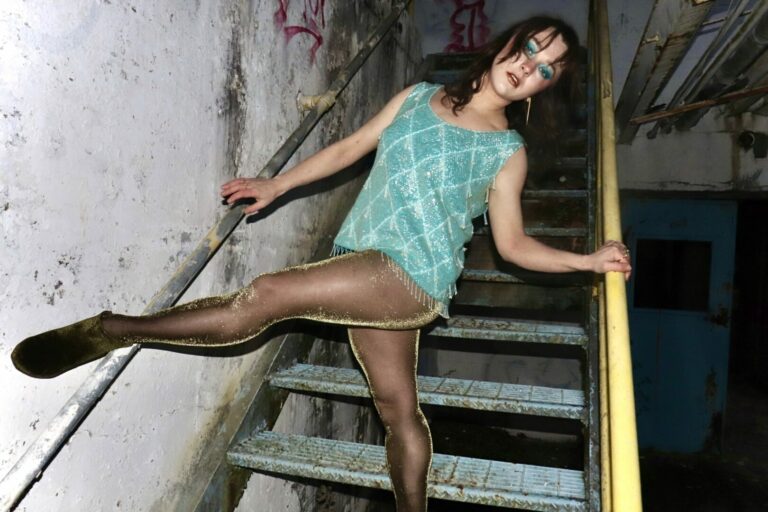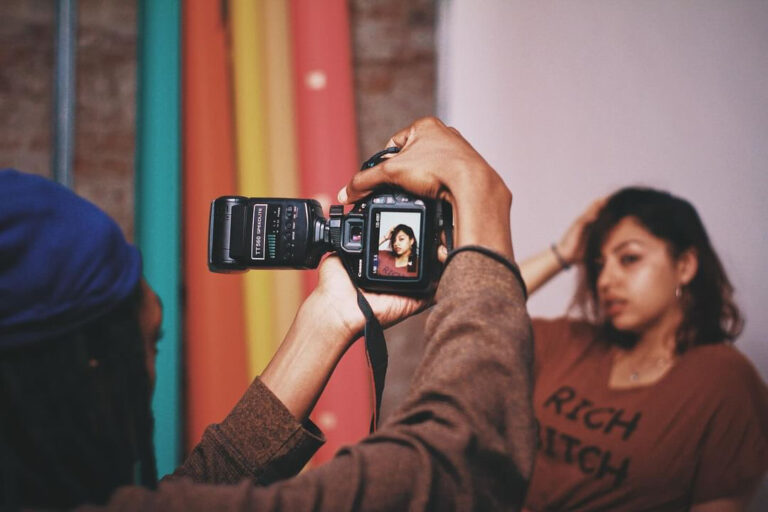Alright – so today we’ve got the honor of introducing you to Renée Nicholson. We think you’ll enjoy our conversation, we’ve shared it below.
Hi Renée, thanks for sharing your insights with our community today. Part of your success, no doubt, is due to your work ethic and so we’d love if you could open up about where you got your work ethic from?
I grew up studying ballet, and soon was tracked into a professional training program. Ballet training is all about showing up daily and repeating steps over and over until they are muscle memory. You have to give yourself over to the process, as this technique becomes the foundation for artistry. I trained like this starting twice a week at age seven, to six days a week for six or more hours in my teen years. So, in many ways, work ethic was baked into me as I studied dance.
At the same time, my work ethic was shaped from the actual work, my teachers and coaches instilled a deep love of the art form in me. And I think today, although not a performing dancer anymore, that it’s both about the dedication and about the love, in equal parts. It’s about wanting to master something beautiful and elusive. Now, it’s about crafting beautiful lines in poems or sentences in other writing. Sometimes I close my eyes and try to feel the musicality in language, the way I used to feel the music in my steps.


Let’s take a small detour – maybe you can share a bit about yourself before we dive back into some of the other questions we had for you?
My world is about words–how they convey something meaningful, move people to see beauty, help people when they are struggling with illness, bring voice to those who feel without voice. I recently left a position in academia to focus on the work of writing, both my own, and writing in healthcare. I’ve worked with patients with ALS, cancer, and HIV and with health providers, such as physicians, nurses, pharmacists, and others. Narrative medicine allows us to bring story practice into healthcare spaces, in order to acknowledge, absorb, interpret and act on the stories of others, bringing a narrative competence into clinical spaces. Patients and providers become people through their stories, helping to instill a sense of trust between them.
I’m always working on my own books, but I also collaborate with other kinds of artists, like photographers and other visual artists, as well as healthcare professionals and patients to help foster authentic storytelling in healthcare. With patients, often the stories help connect them with their lives prior to being in treatment. With professionals, it helps instill a sense of community and those reasons they chose healthcare fields, resulting in lowered instances of burnout. As a patient with rheumatoid arthritis, I help reconcile my past as a dancer and my present as a writer. I also lost my younger brother to cancer, and have written my grief and recovery, finding a way to make meaning of it all through artistic practice.
At its core, my work is about connection and hope.


There is so much advice out there about all the different skills and qualities folks need to develop in order to succeed in today’s highly competitive environment and often it can feel overwhelming. So, if we had to break it down to just the three that matter most, which three skills or qualities would you focus on?
I believe the best artists and writers have a deep sense of compassion for others. While we can’t view the world through the proverbial rose-colored glasses, we can bring forth difficult aspects honestly. This honesty helps those who interact with our art feel compassion towards the plights of others. It’s one of the things that art is well equipped to do.
As a writer, I tend not to gloss subjects. My job is to engage the senses, to help probe beneath the surface of things, and to find beauty in unexpected places. I have to be patient with the process, and work through many revisions to try to represent what is as faithfully and unflinchingly as possible.
The characteristic that I think helps the most with this work is curiosity. Being curious often leads me to unexpected places. The best way to be curious is, first, to slow down. Giving your time and attention can be rich in rewards, but in a world that continuously speeds up, it can feel counterintuitive. Learning how to listen, to deeply pay attention to what another has said, or the sounds of music, or the sounds of nature, can help develop that sense of being present. It fosters our sense of empathy as well as curiosity. Perhaps the two are entwined.
Criticism and critique are aspects of a writing and artistic life that aren’t the most pleasant, but can also be important. Some of the toughest critiques have helped me produce my best work. Separating out critique of the work from criticism of the self can be tricky, but its important. And finding ways to nourish oneself after criticism is also important. Rest is restorative.
The writer Robert Gipe gives the advice to “touch your work every day.” This is especially important when you do creative work in addition to a day job to pay the bills. I don’t know many writers who make their living solely from their own writing, but touching your work, meaning that deeply personal creative work, daily keeps you tethered to your art and process.
Finally, develop friendships with other artists. One of my dear friends is a visual artist, and we meet monthly to check in creatively with one another. We also collaborate, which is great fun. Seeing her illustrate one of my poems is a true joy, and shows me how other interpret the work. Investing in creative relationships can be fruitful, but also vital in those moments of doubt or rejection.


Alright, so before we go we want to ask you to take a moment to reflect and share what you think you would do if you somehow knew you only had a decade of life left?
Earlier this year, I quit my job to focus on my creative work. While I feel like I regained much from doing this, including feeling like my work better reflected how I saw myself, I had to figure out how to manage my time differently. I have three main things I’m focused on: consulting in the narrative medicine space (mostly with universities and healthcare groups), serving as a series editor for a health humanities and narrative medicine book series, and my own writing.
I did not want to lose sight of that last one: my own writing.
In my past few jobs, I technically “moved up” but in doing this I also moved away from my writing projects. My time became subsumed in my work positions, chipping away at my non work hours, which were the only times I had to write. I started thinking about all the books I’d never write. That’s a terrible feeling!
Now, I have to think about my time in thirds, even as the last–my own writing–might have different dividends than earning money, or earning money now. And while I have times when I slip into old habits, most weeks, I give a third of my working hours to my own writing. And this feels like the gift I’ve given myself. I’m in my early fifties, so the time is now to pursue this writing. And my other work helps feed rather than take from that writing.
Finding the balance is tricky, but not impossible. I know there are people who think I’m nuts to have given up the stable income to do consulting, editing, and writing. But my heart is full, and I’m making it work. I believe in myself in a whole different way. I wake up thinking about the book I’m working on, and I go to bed thinking about that book, too. And in between, I help some other with art making. That’s a beautiful life. It’s worth figuring out the balance to have so much creative work and meaning making in every day.
It often starts with taking in a big breath, exhaling, and thinking, “What could be?”
Contact Info:
- Website: www.reneenicholson,com
- Instagram: @ReneeKwrites
- Linkedin: https://www.linkedin.com/in/renee-k-nicholson-6526b/
- Twitter: @summerbooks1
- Soundcloud: https://soundcloud.com/ryan-mccarthy-967040210
- Other: https://wvupressonline.com/series/connective_tissue


Image Credits
Molly Humphreys (healthcare is human, author photos)
so if you or someone you know deserves recognition please let us know here.




